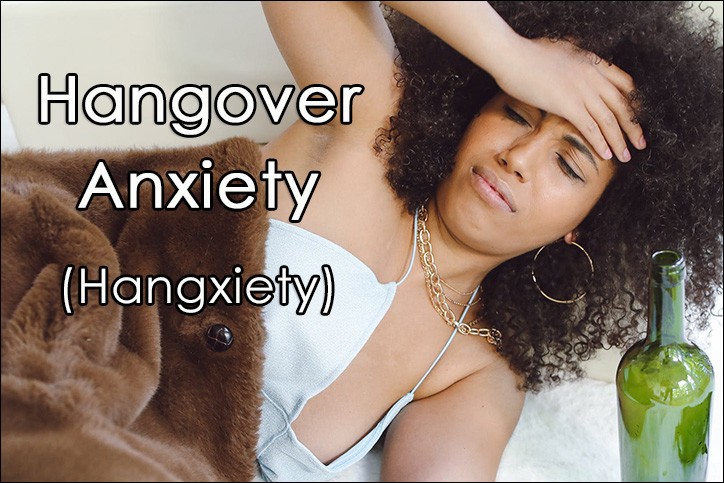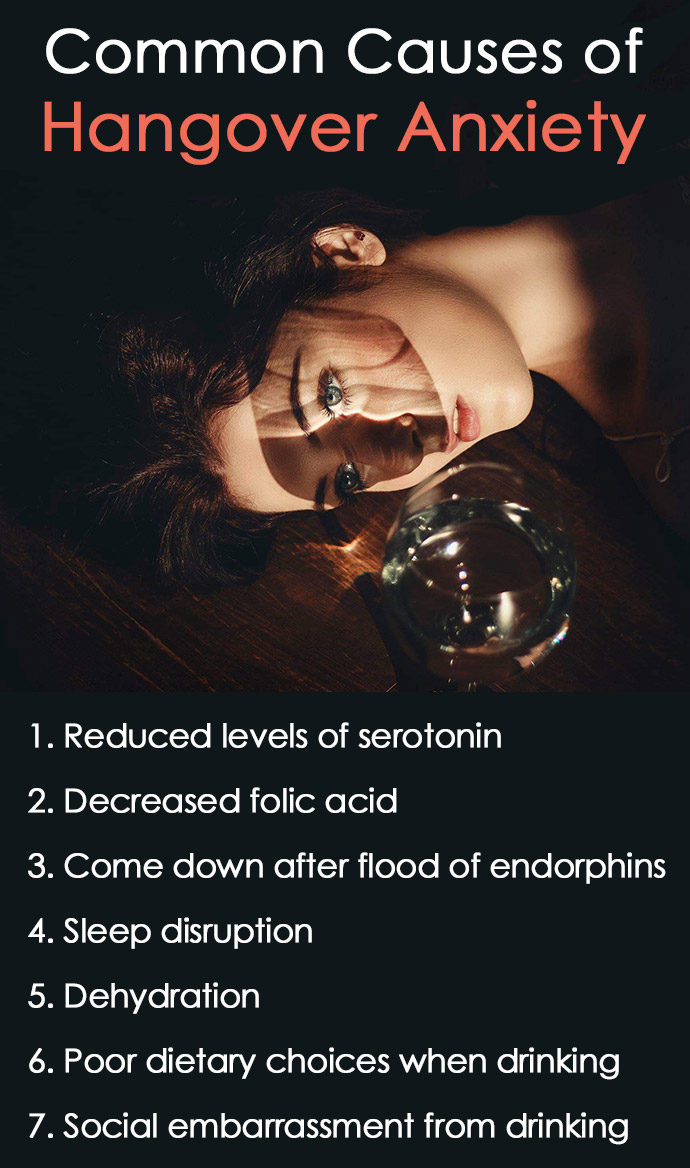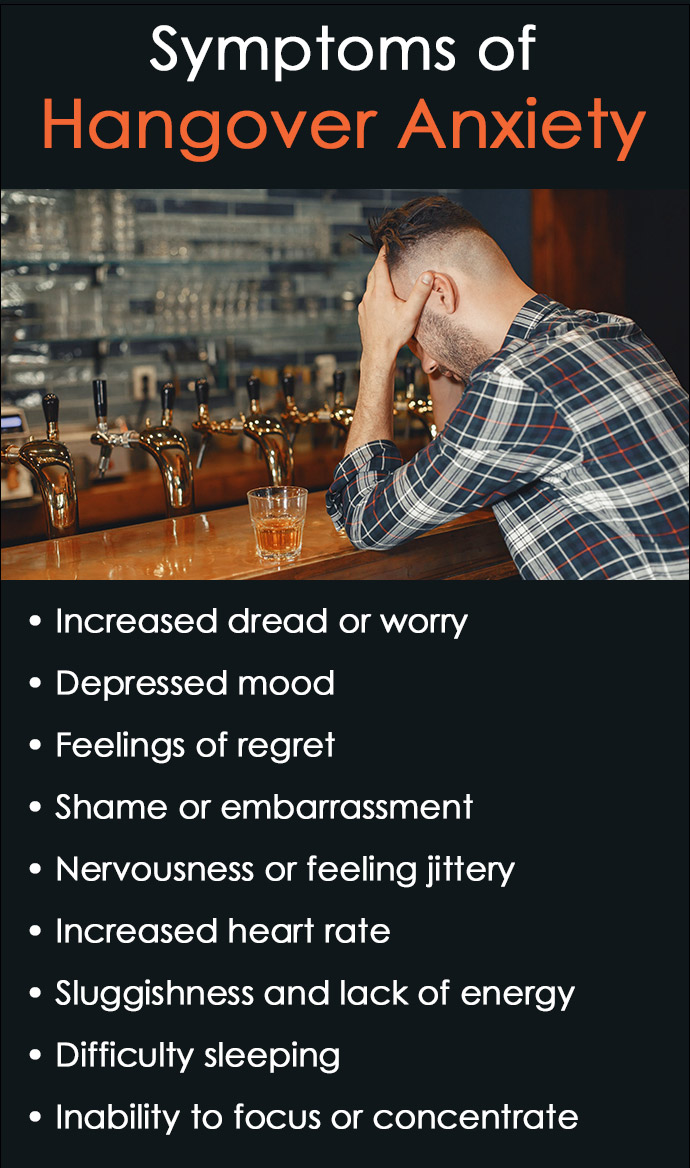Table of Contents
Anyone who has ever experienced hangover anxiety will have no problem understanding the term Hangxiety.
They physical symptoms of a hangover caused by drinking too much alcohol are brutal enough. But what’s often left out of the conversation is the mental and emotional toll that alcohol consumption can have on a person.
Hangxiety is a term coined for the feelings of anxiety that can coincide with the nausea, dehydration, headache, and other symptoms of a hangover.
What is Hangover Anxiety (Hangxiety)?
Hangover anxiety is a sense of nervousness, fear, or worry that accompanies the often very uncomfortable physical symptoms of alcohol withdrawal after a day or night of drinking.
While people who experience anxiety disorders may be more prone to “hangxiety,” even those without preexisting mental health issues may experience heightened feelings of dread, insecurity, and worry during a hangover.
Anxiety disorders are one of the most common forms of mental health disorders.
The Anxiety and Depression Association of America reports that an estimated 3.1 percent of the U. S. population, or nearly 7 million adults suffer from generalized anxiety disorder.
Research into the mental and emotional toll that excessive alcohol consumption can have suggests that as many as 12 percent of people experience hangover anxiety, with the severity of symptoms varying from person to person, according to the Journal of Clinical Medicine.
What Causes Anxiety After Drinking?
There are many causes of anxiety, with alcohol and substance use being one of them.
In addition, there are a number of different factors that impact feelings of anxiety after drinking alcohol.
It’s important to point out that a hangover is actually a mild form of alcohol withdrawal. The withdrawal period generally lasts from 24 to 72 hours and occurs while the body is going through the chemical process of detoxification.
Common causes of hangover anxiety include:
1. Alcohol consumption affects the levels of serotonin in the brain, a chemical that has a direct impact on our mental wellbeing.
2. Drinking alcohol depletes folic acid in the body, a mineral believed to play a role in mood.
3. Alcohol releases a flood of endorphins, often referred to as a “feel good” neurotransmitter that can lead to an eventual negative comedown.
4. Sleep disruption, dehydration, and poor dietary choices while drinking make the symptoms of withdrawal and the accompanying hangover anxiety worse.
5. The potential anxiety of social embarrassment while drinking.
With as little as one or two drinks, alcohol lowers people’s inhibitions, causing them to say or act in ways that they might not otherwise.
The regret of these actions, or not being able to remember what happened while drinking can severely increase and intensify hangover anxiety.
Alcohol Induced Anxiety Symptoms
The mental and emotional symptoms of alcohol-induced anxiety are never fun. The physical discomfort caused by drinking too much can compound the anxiety and cause it to last longer than most people expect.
Some common symptoms of hangover anxiety include:
- Increased sense of dread or worry
- Depressed mood
- Feelings of regret
- Shame or embarrassment from behavior while under the influence of alcohol
- A general sense of nervousness, or feeling jittery and uncomfortable
- Increased heart rate
- Sluggishness and lack of energy
- Difficulty sleeping
- An inability to focus and concentrate as a result of increased worry
The severity of these symptoms will vary from person to person and can range anywhere from mild to extreme.
The duration of hangxiety symptoms can also vary, depending on how much a person drank and how long it takes the body to process the alcohol.
The good news is that anxiety after drinking is temporary for most people. More importantly, it is also preventable.
Is There a Hangover Anxiety Cure?
The straightforward and simple answer to curing hangover anxiety is to avoid drinking alcohol altogether.
That said, there are steps people can take before and after drinking alcohol to avoid or reduce a hangover and anxiety.
Ways to Reduce an Anxiety Hangover Before and While Drinking
1. Limit alcohol intake
For some people, enjoying one or maybe two drinks is easy. For others, one or two drinks typically leads to continued drinking because alcohol affects our decision making process.
Making the decision ahead of time to limit alcohol to just one or two drinks can help people slow down and make it easier to stop drinking when they hit the limit.
Unfortunately, some people will find that they are unable to control their drinking regardless of plans or safeguards put into place.
For those who cannot limit their drinking or the consequences it causes, it may be necessary to seek alcohol treatment.
2. Eat food before or during drinking
Drinking on an empty stomach leads to getting drunk quicker, so eat something substantial before drinking. It can also be helpful to have a snack while drinking, which will lessen the effect of alcohol on the body.
While eating before bed is not usually recommended, if you find that you’re hungry after a night of drinking, eating a snack before bed can help minimize some of the affects of a hangover.
3. Hydrate with water
Dehydration is one of the worst symptoms of a hangover, not only hurting the body, but also leading to hangover anxiety.
Matching each alcoholic beverage with a glass of water not only helps slow down a person’s alcohol intake, it also helps keep the body hydrated. Just be prepared to go to the bathroom more often.
Cure for Hangover Anxiety After Drinking
1. Hydrate with water
Drinking plenty of water after drinking will fuel the body with what it needs most to overcome dehydration. This should be done before going to bed and after waking up.
2. Sleep
It may seem like it’s easy to go to sleep after drinking. The reality is alcohol causes poor sleep patterns during the night, which is one reason for feeling sluggish in the morning.
Going back to bed or taking a nap if possible will help the body regenerate and lessen the feelings of hangover anxiety.
3. Pain medications
When the physical effects of drinking cause a headache or body aches, taking an over the counter pain medication like aspirin or ibuprofen can shorten the duration of pain.
Not only will this help with the physical symptoms, but it can also have an impact on lowering the anxiety from withdrawal. It’s always recommended to avoid taking Tylenol during or immediately after drinking alcohol.
4. Eat a light meal
Eating something light and bland will absorb any alcohol remaining in the system and nourish the body.
The BRAT Diet (bananas, rice, applesauce and toast) is a good option, as well as soup, oatmeal, and crackers.
5. Mindfulness and Meditation
Using mindfulness and meditation with controlled breathing can be effective for easing the symptoms of anxiety caused by drinking.
Meditation will also distract the mind from feeling crappy physically.
6. Light exercise
Most people find it difficult to get out of bed or function normally, let alone exercise when experiencing hangover anxiety.
Doing something easy like taking a walk outdoors will get the blood circulating and boost endorphins to ease pain and improve mood.
Most people will start to feel better in a day or two after the alcohol makes its way out of the system.
As mentioned previously, the best way to avoid hangxiety altogether is to not drink at all. But for those who drink and regularly experience anxiety after drinking, the tips outlined here will help make it more manageable.





